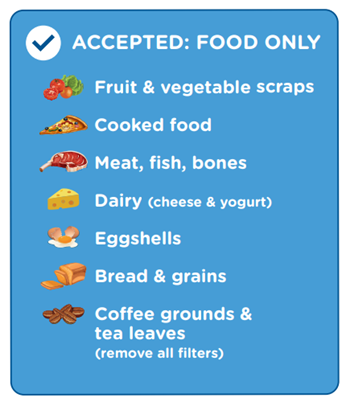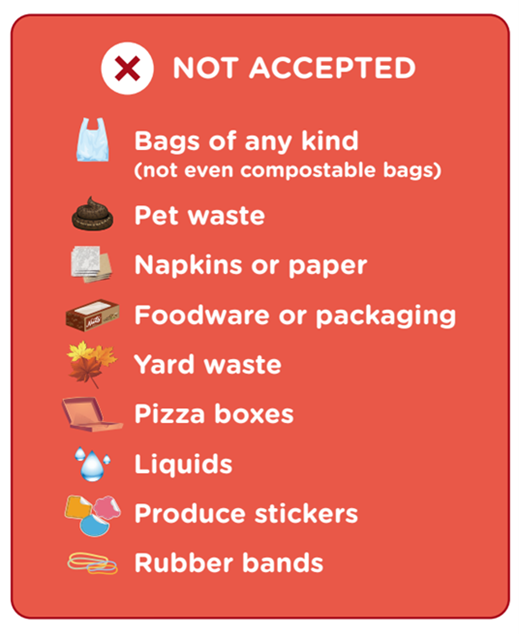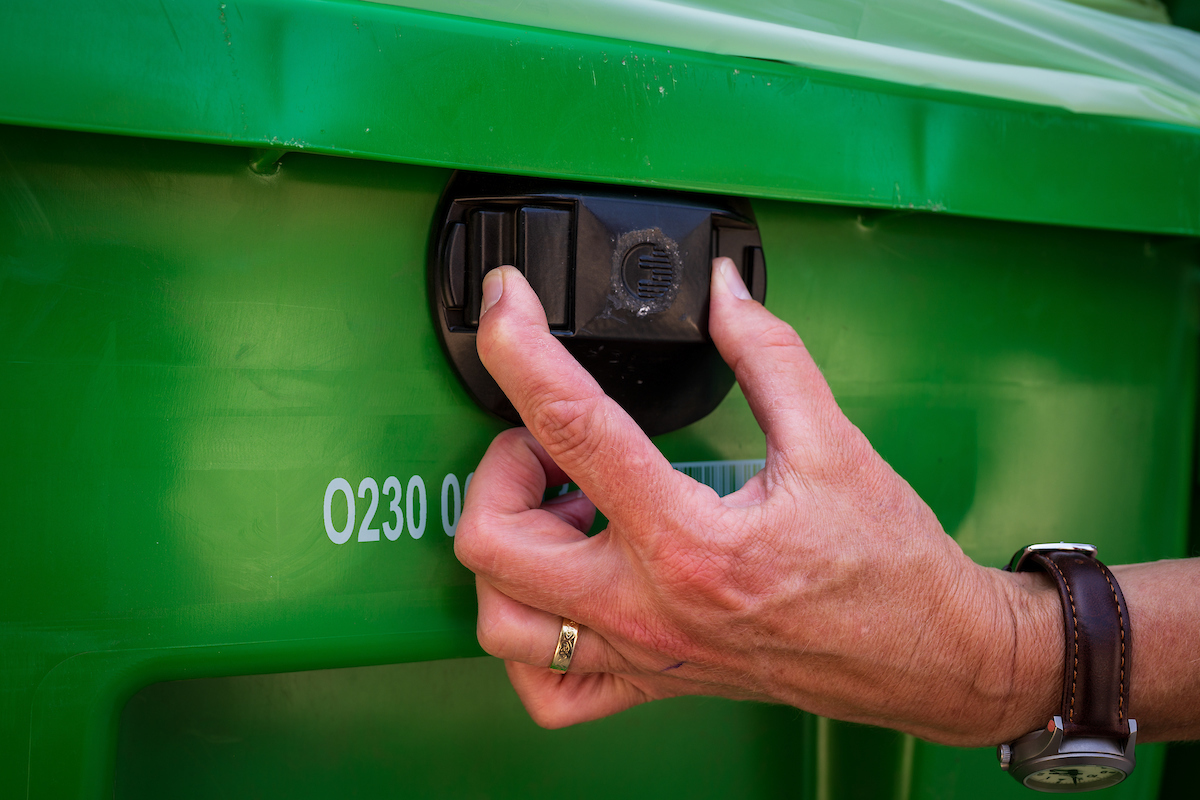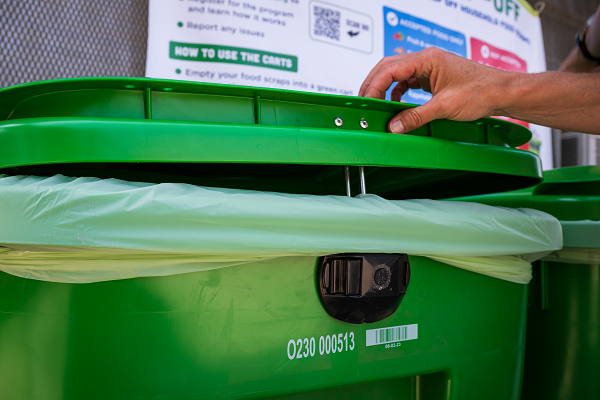Food Scrap Drop-Off
Hey Chicago, let’s compost!
The City of Chicago is launching its first-ever citywide Food Scrap Drop-Off Program, and all Chicago residents are welcome to drop off their household food scraps for composting at one of 17 locations across the city– for FREE!
Composting keeps food scraps out of landfills, reduces harmful greenhouse gas emissions, and recycles nutrients that enrich soil.
Thank you for helping to meet Chicago’s climate action goals and building healthy soil!
 How To Get Started
How To Get Started

1. Find a location using the interactive map below
- Click on green icon for all location information.
2. Sign up for a drop-off site
- Use Food Scrap Drop-Off Form to sign up for one of the drop-off sites.
3. Collect food scraps in a container of your choice in your kitchen
- Choose a kitchen container with a lid.
- Simply place your food scraps directly into your container (without a liner bag) and wash the container when you get home. No bags of any kind, not even certified compostable bags or paper bags, are accepted. If you choose to line your container with a bag, discard the bag after you empty your food scraps at the drop-off site.
- Keep your container in a convenient location, such as your kitchen counter, by your trash can, or in your fridge or freezer. Storing food scraps (especially leftovers, meat, fish, and dairy) in your fridge or freezer will help prevent odors.
- If your kitchen container gets full before you’re ready to visit the drop-off site, empty it into a larger container, such as a 5-gallon bucket with a lid. Store the bucket in a place that outdoor animals can’t access.
- Check list of ACCEPTED and NOT ACCEPTED materials.


4. Bring food scraps to your drop-off site; all sites are open daily 7 am - 7 pm.
- Empty your food scraps into one of the green carts.
- Each cart has a latch located at the front of the lid to prevent wildlife from opening the carts. Please squeeze the buttons to release the latch and open the lid, and make sure the latch is securely closed when complete.
- Help fill up one green cart completely before adding food scraps to an empty cart. This will help conserve cart liners.
- Dispose of any bags or other items that are not accepted in the black trash cart provided at the site.
- To minimize odors, plan to visit the drop-off site about once a week unless you store your food scraps in your freezer.


 Frequently Asked Questions
Frequently Asked Questions

Composting is a controlled, aerobic (oxygen-using) process that converts organic matter (i.e. food scraps) into compost, materials that can be added to the soil as a nutrient. Microorganisms, including bacteria and fungi, feed on the carbon and nitrogen in the organic matter to grow and reproduce. Compost, the end product, is a dark, crumbly, earthy-smelling material that can be used to build healthy soil (USEPA).
When food scraps and other organic materials such as yard trimmings decompose in a landfill, it creates methane, a potent greenhouse gas that causes climate change. Keeping wasted food and other organic materials out of landfills significantly reduces methane emissions.
Adding finished compost to soil:
- Returns nutrients and beneficial organisms to soil, reducing the need for pesticides and fertilizers
- Helps retain soil moisture, improves soil structure, and reduces the potential for soil erosion
- Keeps carbon in the soil (USEPA)
Chicago Department of Streets and Sanitation crews will collect the food scraps and bring them to a city transfer facility. From there, the food scraps will be transported to the Harbor View Composting Facility, located in Chicago and operated by Whole Earth Compost, where they will be processed into compost, a valuable product that will be used to build healthy soil.
The City of Chicago aims for this program to produce high-quality, clean compost that can be used to build healthy soils. To keep the messaging clear and simple and avoid potential sources of contamination, no bags of any kind, not even certified compostable bags, are accepted with the food scraps.
If you would like to use a bag to line your food scrap container at home, please remove the bag when you empty your food scraps into the green cart and dispose of it in the black trash cart at the drop-off site.
Save money by avoiding bags altogether and simply washing your food scrap collection container when you get home from the drop-off site.
The City of Chicago aims for this program to produce a high-quality, clean compost that can be used to nourish and build healthy soils. This program accepts only food scraps to keep the messaging clear and simple and avoid potential sources of contamination.
For pizza boxes, tear off all parts of the box that are not greasy or food-soiled and recycle them in your Blue Cart or other recycling service. Dispose of the greasy or food-soiled parts of the pizza box in the trash.
Animal products or cooked food should not be added to backyard compost bins because they can attract rodents and the microbes in a backyard bin may not generate high enough temperatures to kill pathogens that may be introduced by these foods. Food scraps collected for this program will be composted at a commercial scale composting facility which uses large windrows that reach temperatures high enough to kill pathogens and more quickly break down materials.
Yes, do both! Backyard composting is a great way to keep fruit and vegetable scraps and yard waste (which may make up the majority of your compostable household materials) out of the municipal waste system altogether. Backyard composting has a lower carbon footprint since it doesn’t require transportation, and you can use the finished compost in your garden. So please do continue to use your backyard bin for your plant-based food scraps and yard waste and take the rest of your food scraps (meat, dairy, cooked foods, bread & grains) to the food scrap drop-off location nearest you.
A typical household wastes about $1,500 per year on food that isn’t eaten (USDA). Wasted food also wastes all the water, energy, land, labor, and money that went into producing it. Preventing food waste in the first place helps reduce greenhouse gas emissions and saves you money.
Shop smart, store your food so it lasts longer, and use your leftovers creatively. Learn how at:
Some key statistics:
- In the U.S., 38% of all food goes unsold or uneaten – and most of that goes to waste (ReFED).
- Food waste makes up over 24% of municipal solid waste in the U.S., more than any other material (USEPA, 2019 Wasted Food Report).
To report an issue or provide feedback on the Food Scrap Drop-Off Program, please reach out to dsscomposting@cityofchicago.org or contact 312-744-2413.
